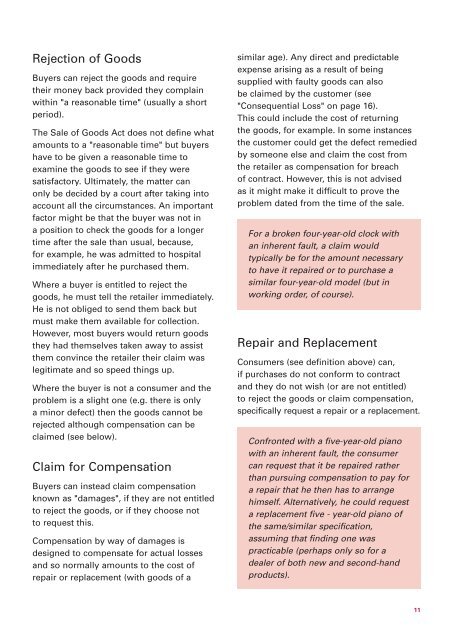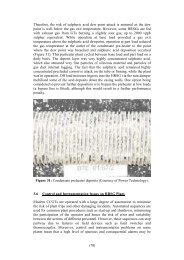A traders guide: the law relating to the - DTI Home
A traders guide: the law relating to the - DTI Home
A traders guide: the law relating to the - DTI Home
Create successful ePaper yourself
Turn your PDF publications into a flip-book with our unique Google optimized e-Paper software.
Rejection of Goods<br />
Buyers can reject <strong>the</strong> goods and require<br />
<strong>the</strong>ir money back provided <strong>the</strong>y complain<br />
within "a reasonable time" (usually a short<br />
period).<br />
The Sale of Goods Act does not define what<br />
amounts <strong>to</strong> a "reasonable time" but buyers<br />
have <strong>to</strong> be given a reasonable time <strong>to</strong><br />
examine <strong>the</strong> goods <strong>to</strong> see if <strong>the</strong>y were<br />
satisfac<strong>to</strong>ry. Ultimately, <strong>the</strong> matter can<br />
only be decided by a court after taking in<strong>to</strong><br />
account all <strong>the</strong> circumstances. An important<br />
fac<strong>to</strong>r might be that <strong>the</strong> buyer was not in<br />
a position <strong>to</strong> check <strong>the</strong> goods for a longer<br />
time after <strong>the</strong> sale than usual, because,<br />
for example, he was admitted <strong>to</strong> hospital<br />
immediately after he purchased <strong>the</strong>m.<br />
Where a buyer is entitled <strong>to</strong> reject <strong>the</strong><br />
goods, he must tell <strong>the</strong> retailer immediately.<br />
He is not obliged <strong>to</strong> send <strong>the</strong>m back but<br />
must make <strong>the</strong>m available for collection.<br />
However, most buyers would return goods<br />
<strong>the</strong>y had <strong>the</strong>mselves taken away <strong>to</strong> assist<br />
<strong>the</strong>m convince <strong>the</strong> retailer <strong>the</strong>ir claim was<br />
legitimate and so speed things up.<br />
Where <strong>the</strong> buyer is not a consumer and <strong>the</strong><br />
problem is a slight one (e.g. <strong>the</strong>re is only<br />
a minor defect) <strong>the</strong>n <strong>the</strong> goods cannot be<br />
rejected although compensation can be<br />
claimed (see below).<br />
Claim for Compensation<br />
Buyers can instead claim compensation<br />
known as "damages", if <strong>the</strong>y are not entitled<br />
<strong>to</strong> reject <strong>the</strong> goods, or if <strong>the</strong>y choose not<br />
<strong>to</strong> request this.<br />
Compensation by way of damages is<br />
designed <strong>to</strong> compensate for actual losses<br />
and so normally amounts <strong>to</strong> <strong>the</strong> cost of<br />
repair or replacement (with goods of a<br />
similar age). Any direct and predictable<br />
expense arising as a result of being<br />
supplied with faulty goods can also<br />
be claimed by <strong>the</strong> cus<strong>to</strong>mer (see<br />
"Consequential Loss" on page 16).<br />
This could include <strong>the</strong> cost of returning<br />
<strong>the</strong> goods, for example. In some instances<br />
<strong>the</strong> cus<strong>to</strong>mer could get <strong>the</strong> defect remedied<br />
by someone else and claim <strong>the</strong> cost from<br />
<strong>the</strong> retailer as compensation for breach<br />
of contract. However, this is not advised<br />
as it might make it difficult <strong>to</strong> prove <strong>the</strong><br />
problem dated from <strong>the</strong> time of <strong>the</strong> sale.<br />
For a broken four-year-old clock with<br />
an inherent fault, a claim would<br />
typically be for <strong>the</strong> amount necessary<br />
<strong>to</strong> have it repaired or <strong>to</strong> purchase a<br />
similar four-year-old model (but in<br />
working order, of course).<br />
Repair and Replacement<br />
Consumers (see definition above) can,<br />
if purchases do not conform <strong>to</strong> contract<br />
and <strong>the</strong>y do not wish (or are not entitled)<br />
<strong>to</strong> reject <strong>the</strong> goods or claim compensation,<br />
specifically request a repair or a replacement.<br />
Confronted with a five-year-old piano<br />
with an inherent fault, <strong>the</strong> consumer<br />
can request that it be repaired ra<strong>the</strong>r<br />
than pursuing compensation <strong>to</strong> pay for<br />
a repair that he <strong>the</strong>n has <strong>to</strong> arrange<br />
himself. Alternatively, he could request<br />
a replacement five - year-old piano of<br />
<strong>the</strong> same/similar specification,<br />
assuming that finding one was<br />
practicable (perhaps only so for a<br />
dealer of both new and second-hand<br />
products).<br />
11
















